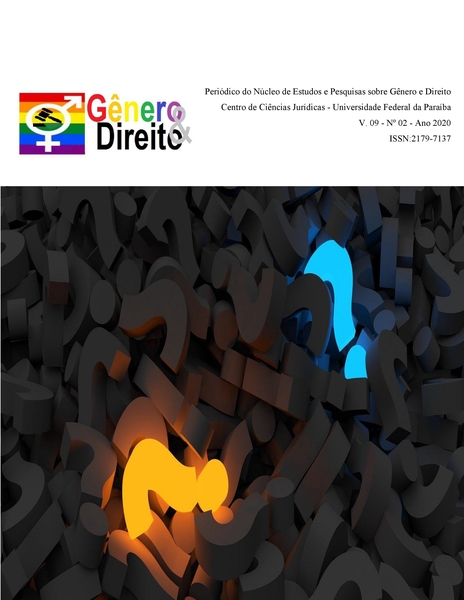DEVELOPMENT OF ETHNOCULTURAL COMPETENCE IN FUTURE PRIMARY SCHOOL TEACHERS
DOI:
https://doi.org/10.22478/ufpb.2179-7137.2020v9n2.50786Palavras-chave:
multicultural education, ethnocultural competence, students, professional training, primary school teacherResumo
The article focuses on problems with ethnocultural competence as a component of the professional and pedagogical training provided by the Pedagogical Institute at M.K. Ammosov North-Eastern Federal University in the Republic of Sakha (Yakutia). The article identifies the characteristics of ethnocultural competence development in future primary school teachers. The main research methods include an analysis of literary sources, a pedagogical experience summary, observations, a discussion, data recording, and ranking. Primary school teachers are key figures and spiritual heritage broadcasters in the educational process. The ethnocultural competence of an education professional is increasingly important due to the development of new forms of information transformation and an increasing demand in modern society. Moreover, ethnocultural competence is an integral professional and personal characteristic that determines the willingness and ability to pursue ethnocultural education, national culture introduction to primary school students, and the formation of respect for and a positive, tolerant attitude toward other nations’ cultures. The term ethnoculture consists of the words “ethnos” and “culture,” which are equally interdependent. Culture is a compound, historically developed system of material, spiritual, and social expressions of human activity. It reflects how humans understand reality through its content, morphology, and functions. One of the main objectives of culture is to promote a positive attitude toward the ethnocultural differences that influence human development and self-realization. Ethnocultural education contributes to interethnic relations, protection, and development. In addition, it reveals the characteristics and spiritual and moral values of ethnic groups and impacts interethnic and interfaith communication among students. In this research, an ethnocultural training model for future teachers and students’ ethnocultural competence was developed and tested. In addition, the pedagogical conditions for the formation of the ethnocultural competence of future primary school teachers were identified, and university students’ experiences with the formation of ethnocultural competence were classified and generalized
Downloads
Referências
Baisheva, M.I., Andreeva, L.D., Dedukina, M.I., Maximova, L.I., Nikolaeva, A.V., Makarova, T.A. (2017), “Ethnocultural traditions as sources of maintenance of spiritually-valuable bases of safety of the person”, Man in India, 97(15), 201-210.
Baisheva, M.I., Grigoryeva, A.A., Neustroeva, A.N., Borisova, T.M., Sidorova E.E., Iliynova T.L. (2017), “Spiritual dominance of the Sakha people traditional belief in the personality development of children”, Journal of Social Studies Education Research, 8(3), 139-148.
Bergsmann, E., Schultes, M.-T., Winter, P., Schober, B., Spiel, C. (2015), “Evaluation of competence-based teaching in higher education: From theory to practice”, Evaluation and Program Planning, 52, 1–9.
Biggs, J. (2012), “What the student does: Teaching for enhanced learning”, Higher Education Research and Development, 31(1), 39–55.
Dekker-Groen, A.M., van Der Schaaf, M.F., Stokking, K.M. (2013), “A teacher competence development program for supporting students' reflection skills”, Teachers and Teaching: Theory and Practice, 19(2), 150–171.
Dmitrieva, S.N., Evdokarova, T.V., Abramova, N.A., Okoneshnikova, N.V. (2019), “Implementation of the model of the self-education pedagogical support for university students in the republic of Saha (Yakutia)”, Espacios, 40(12), 26.
Ethnopedagogy at the turn of the new millennium: problems and prospects. (2000), Sterlitamak: SSPI.
Federal Law “On Education in the Russian Federation”. (2016), Moscow: Prospect.
Federal State Educational Standard of the Primary General Education. (n.d.), at https://fgos.ru/
Feiman-Nemser, S. (2001), “From preparation to practice: Designing a continuum to strengthen and sustain teaching”, Teachers College Record, 103(6), 1013–1055.
Lampert, M. (2003), “Teaching problems and the problems of teaching”, Teachers College Record, 105, 178–182.
National Council for Accreditation of Teacher Education. (2010), The case for high quality teacher preparation: What makes a teacher “effective?”, USA Today, at http://www.nctq.org/nctq/images/USA_Today_02-14-07.pdf
Neustroev, N.D, Neustroeva, A.N, Shergina, T.A, Marfusalova, V.P, Okonechnikova, N.V, Borisova, T.M., Sidorova, E.E. (2016), “Training a Tutor at College for an Underfilled and Nomad School of the North and East of Russia: Contents and Specifics”, Indian Journal of Science and Technology, 9(11).
Nikolaeva, A.D., Barakhsanova, E.A., Golikov A.I. (2014), “Strategic priorities for the modernization of the system of continuous pedagogical education”, Modern problems of science and education, 4, 83-89.
Okoneshnikova, A.P. (1999), Interethnic perception and people’s understanding of each other. Perm: Zvezda.
Orlov, A.A. (2001), Pedagogy: concept and curriculum for students of pedagogical university. Tula: Publishing House of Tula State Lev Tolstoy Pedagogical University.
Portnyagin, I.S. (1999), Ethnopedagogy “Kut-sur”: pedagogical views of Sakha people. Moscow: M.K. Ammosov State University.
Reznikov, E.N., Tovuu, N.O. (2002), Ethnopsychological characteristics of Tyva people: theory and practice. Moscow. PER SE.
Sayfutdiyarova, E.F. (2012), “Interethnic Perception as a Subject of Scientific Research”, Philоlоgy and сulturе, 3(29), 305-308.
Slastenin, V.A. (2009), Pedagogy and Psychology of Innovative Education. Moscow. Prometey.
Tang Keow Ngang, Hashimah Mohd Yunus, Nor Hashimah Hashim. (2015), “Soft Skills Integration in Teaching Professional Training : Novice Teachers’ Perspectives”, Procedia - Social and Behavioral Sciences, 186, 835–840.
Teacher, H., Assessments, P., Measure, C., Teaching, I. (2010), “Evaluating Teacher Effectiveness”, October, 11(October), 54–60.
Tynjälä, P., Heikkinen, H.L.T. (2011), “Beginning teachers’ transition from pre-service education to working life: Theoretical perspectives and best practices”, Zeitschrift Fur Erziehungswissenschaft, 14(1), 11–33.
Vlasova, E.Z., Goncharova, S.V., Barakhsanova, E.A., Karpova, N.A., Iljina, T.S. (2019), “Artificial intelligence for effective professional training of teachers in the Russian Federation”, Espacios, 40, 22, 9.
Volkov, G.N. (2002), The pedagogy of love. Selected Ethnopedagogical Works: in 2 vols. Moscow. Publishing House MAGISTR-PRESS

